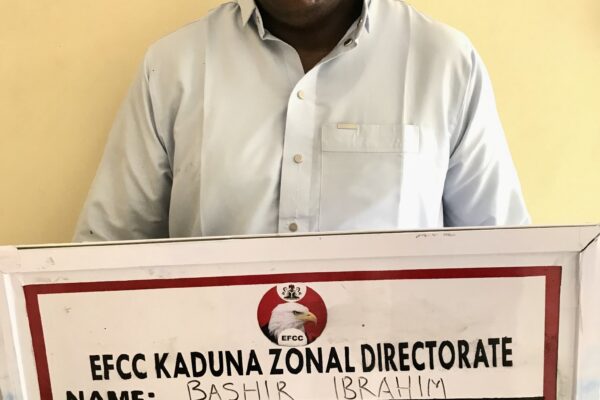
EFCC Arrests Ex-Government Contractor for Alleged N30b Fraud in Kaduna
The Kaduna Zonal Directorate of the Economic and Financial Crimes Commission, EFCC, has arrested one Bashir Bello Ibrahim, a former Kaduna State government contractor and Chief Executive Officer, CEO, Formal Act Legacy Limited for alleged multiple fraud to the tune of N30 billion. Though his contract with the state government had been terminated, no less than 251 complaints received by the Commission against the suspect pointed to the allegation that Ibrahim is parading himself to unsuspecting victims as consultant for the 23 local government areas in Kaduna State as well as that of the United Charity Foundation, UCF, FICCORD with affiliation to Sustainable Development Goals, SDGs Office. It is also alleged that he informed his victims that he had a 2020 Memorandum of Understanding, MoU with the Kaduna State government for the purpose of sourcing intervention grants from global donor agencies for the funding of LGA projects in the state and supporting the actualization of SDGs within the state. While investigations revealed that the suspect is not a consultant to UCF, his 2020 MoU with Kaduna State government was terminated by the state government in October 2023 as a result of default on the terms of the MoU by the suspect. However, despite the termination of the MoU, the suspect intentionally engaged in unauthorised award of fictitious contracts to the tune of approximately N30 billion (Thirty Billion Naira) by convincing his contractor victims to supply items meant for construction of hospitals, motorised boreholes, hospital beds and mattresses, drugs and vaccines which he would allegedly receive on behalf of the Kaduna State government, sold some and diverted their proceeds to his personal use. From investigations, it was further discovered that when he took delivery of the supplies, he would warehouse them, kept the LGAs in the dark about their delivery and furthermore, failed to pay he contractors the value of what they supplied. It is also alleged that the suspect was selling contract award papers using proxies with whom he shared the proceeds. These fraudulent acts coupled with his unilateral alteration of the nature of the contracts and their terms, allegedly led to the termination of the MoU he had with the state government in 2023. Items recovered from him include Toyota Hilux pick up vans, ambulances, buses, dispatch motorcycles, caches of drugs and vaccines for children, stacks of hospital beds and mattresses and heavy duty generators. Found in his office store are large quantities of tablets, capsules, syrups, infusions, ointments/creams; medical consumables that include hand gloves, syringes, and mucus extractor. The Commission is collaborating with NAFDAC and the Kaduna State Ministry of Health in the evaluation of the cache of medicines found in his storage facilities as well as in carrying out qualitative analysis on them. Following the inspections, Umar Ahmad Suleiman, Investigation and Enforcement Officer, Federal Tax Force, NAFDAC said some of the drug manufacturers registered with NAFDAC and that while some of the medicines are still within shelf life, some have expired with some being outright counterfeits and their manufacturers, unregistered with NAFDAC. Corroborating the position of the NAFDAC official, Abubakar Isa Balarabe, a pharmacist and Team Leader, Ministry of Health Kaduna State observed that some of the medicines have expired, noting also that the warehouse where the medicines were stored fell below standard. “The storage is not fit for any medicine because of the way and manner it was kept,” he said. The suspect will be charged to court as soon as the investigation is concluded.








